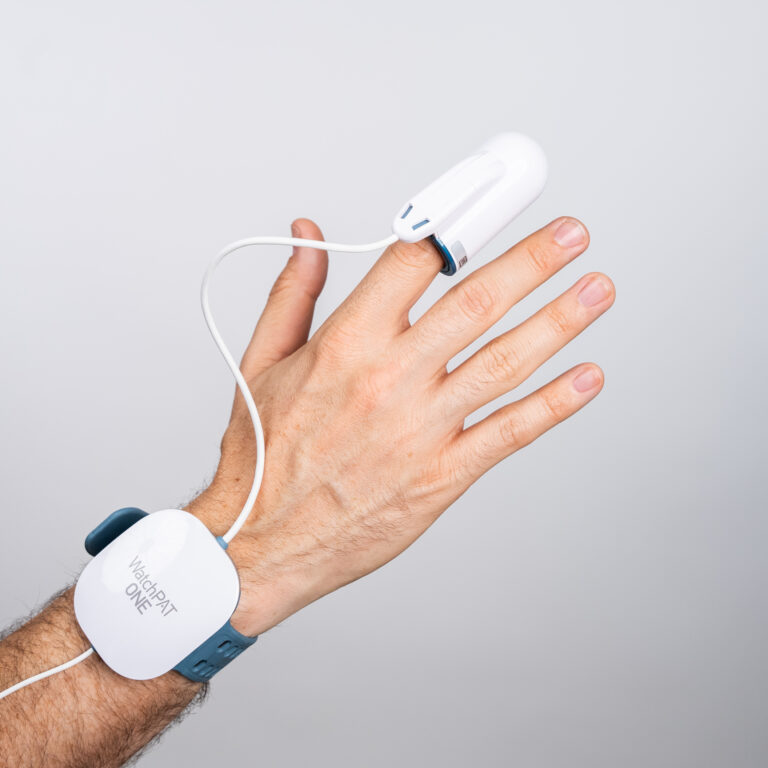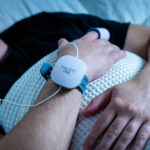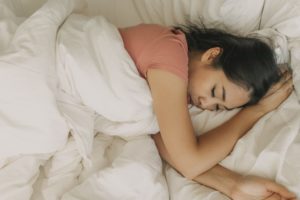When you buy through our links, we may earn a commission. Products or services may be offered by an affiliated entity. Learn more.
Myth: Do You Eat Spiders in Your Sleep?
The idea that people eat spiders while sleeping is a myth that has been spread far and wide, thanks in part to the internet. Although there is no evidence that spiders crawl into people’s mouths at night, widespread fear of spiders may help to perpetuate this urban legend.
For anyone concerned about swallowing spiders in their sleep, it may help to know why this is unlikely to happen and how little danger most spiders pose to humans.
Struggling to Stay Awake? Take an At-Home Sleep Test

our partner at sleepdoctor.com
10% off Home Sleep Tests
Buy Now“Truly grateful for this home sleep test. Fair pricing and improved my sleep!”
Dawn G. – Verified Tester
Do Spiders Crawl Into Your Mouth When You Sleep?
There is no proof that spiders crawl into people’s mouths while they are sleeping. Moreover, scientists point to many reasons why this is not likely to happen.
- Humans are bigger: Spiders probably see a sleeping human as a predator that should be avoided. Because they can sense vibrations, spiders are also likely to be scared off by the movements and noises people make while sleeping.
- Spiders are not hostile: Spiders are typically not out to attack people, and they rarely bite humans. When they encounter a human, spiders are more likely to run away. Most spiders will only bite in self-defense , such as when someone rolls over on them or they are otherwise trapped.
- Spiders want to stay away: Not many spiders live in people’s houses to begin with, as they tend to make their homes in their natural outdoor habitat. When they do live inside, they prefer quiet, dark, secluded spots where they will not be disturbed.
- It is hard to swallow a spider: It is not likely that a spider could get into someone’s mouth, much less be swallowed when a person is asleep. While humans do swallow sporadically while they sleep, there are long periods of time when no swallowing takes place.
- People typically sleep with their mouths closed: It is usually easier to breathe through the nose during sleep, so sleepers tend to sleep with their mouths closed. This would make it hard for a spider to crawl inside.
Where Did This Idea Come From?
Although the idea of eating spiders during sleep shows up all over the internet, it is not clear exactly how this myth got started. But spiders are the subjects of many myths and urban legends.
Interestingly, when researchers who study the spread of misinformation analyzed online news stories about human-spider contact, they found mistakes in almost half of all the content published between 2010 and 2020. Furthermore, they found that 43% of stories about spiders were written to shock the reader , perhaps because people may be more likely to share sensationalist stories on social media.
Fear of Spiders Is Common
The myth that people eat spiders while they sleep may be perpetuated because so many people fear spiders and find them repulsive. This may stem from a time when human survival depended on avoiding anything that appeared threatening .
Experts suggest that, of all animals, spiders may elicit the most fear from humans. Arachnophobia, or fear of spiders, is thought to affect from 2.7% to more than 11% of people.
Most Spiders Are Harmless to Humans
Despite their reputation, less than 1% of all spiders are potentially harmful to humans. On the contrary, spiders are good to have around because they eat other insects like flies, beetles, and ants.
Being bitten by a spider is uncommon. Many people mistakenly believe they have a spider bite when it is actually another type of insect bite, infection, or skin irritation.
How to Keep Spiders Out of Your House
If you are worried about spiders in your bedroom or house, you can take steps to keep them out. Tips for reducing spiders in the house include:
- Make sure window and door screens are free of holes and tears
- Check around windows and doors for gaps to the outside
- Inspect the house’s foundation and walls for cracks and holes
- Remove any spider webs found on the outside of the house
- Keep the home dry, since spiders prefer damp areas
- Vacuum frequently, especially in areas where spiders can hide
- Avoid bringing spiders inside on firewood or plants
- Do not let bedding fall too close to the floor
- Try putting spider traps in dark, out-of-the-way spots where spiders may hide

Still have questions? Ask our community!
Join our Sleep Care Community — a trusted hub of sleep health professionals, product specialists, and people just like you. Whether you need expert sleep advice for your insomnia or you’re searching for the perfect mattress, we’ve got you covered. Get personalized guidance from the experts who know sleep best.
References
6 Sources
-
National Institute for Occupational Safety and Health. (2018, May 31). Venomous spiders. Centers for Disease Control and Prevention., Retrieved May 3, 2023, from
https://www.cdc.gov/niosh/topics/spiders/default.html -
Oregon Department of Agriculture. (2016, February). Oregon spiders: Facts and Fiction., Retrieved May 3, 2023, from
https://www.oregon.gov/oda/shared/Documents/Publications/IPPM/OregonSpidersFactAndFiction.pdf -
Mammola, S., Malumbres-Olarte, J., Arabesky, V., Barrales-Alcalá, D. A., Barrion-Dupo, A. L., Benamú, M. A., Bird, T. L., Bogomolova, M., Cardoso, P., Chatzaki, M., Cheng, R. C., Chu, T. A., Classen-Rodríguez, L. M., Čupić, I., Dhiya’ulhaq, N. U., Drapeau Picard, A. P., El-Hennawy, H. K., Elverici, M., Fukushima, C. S., … Scott, C. (2022). The global spread of misinformation on spiders. Current Biology, 32(16), R871–R873.
https://pubmed.ncbi.nlm.nih.gov/35998593/ -
Landová, E., Janovcová, M., Štolhoferová, I., Rádlová, S., Frýdlová, P., Sedláčková, K., & Frynta, D. (2021). Specificity of spiders among fear- and disgust-eliciting arthropods: Spiders are special, but phobics not so much. PloS One, 16(9), e0257726.
https://pubmed.ncbi.nlm.nih.gov/34555103/ -
Mammola, S., Malumbres-Olarte, J., Arabesky, V., Barrales-Alcalá, D. A., Barrion-Dupo, A. L., Benamú, M. A., Bird, T. L., Bogomolova, M., Cardoso, P., Chatzaki, M., Cheng, R. C., Chu, T. A., Classen-Rodríguez, L. M., Čupić, I., Dhiya’ulhaq, N. U., Drapeau Picard, A. P., El-Hennawy, H. K., Elverici, M., Fukushima, C. S., … Scott, C. (2022). An expert-curated global database of online newspaper articles on spiders and spider bites. Scientific Data, 9(1), 109.
https://pubmed.ncbi.nlm.nih.gov/35347145/ -
Barish, R. A. (2022, June). Spider bites. Merck Manual Consumer Version., Retrieved May 3, 2023, from
https://www.merckmanuals.com/home/injuries-and-poisoning/bites-and-stings/spider-bites











